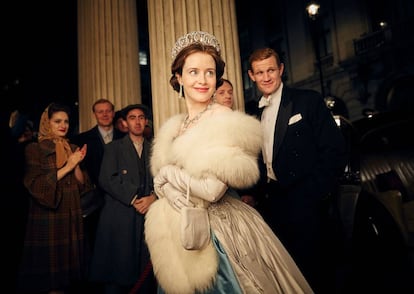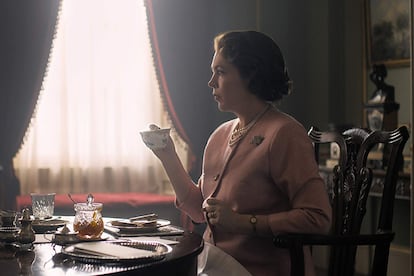The legacy of ‘The Crown’: three queenly actresses and a court of future stars
The performers who have brought Elizabeth II to life have led a series that has served as breeding ground for new talents like Claire Foy, Vanessa Kirby and Elizabeth Debicki

Why do we love The Crown so much? There are several reasons as to why Peter Morgan’s production has become the series of the decade. To start, the mastery with which historical figures who we have witnessed forever locked into protocol and pomp acquire life, flesh, hearts and guts. Then too, a staging that has erected this solemnity at the same height of the humanity of its protagonists. To this, we must add the discreet and, at times, stark capacity to take us into their palaces’ alcoves, and its ambition to portray a historical period — the last half of the 20th century and the beginning of the 21st — that runs disturbingly parallel to our present times. Aside from that, the skill and capacity with which, via superb audiovisual fiction, we have been delighted to swallow the most spectacular propaganda operation ever carried out in the contemporary era in regards to a secular institution.
But a great series would be nothing without actors in a state of grace. On one hand, a nice fistful of established performers have set the bar of excellence, and, on the other, there’s been fresh faces who play their roles as candidates for the league of future stars. That’s also why we have loved The Crown: because its cast and pairings have marked an era, with absolutely outstanding results.
Choosing three performers for the same role is a risky decision. Add in the fact that the character is an icon, and the stakes are even higher. That goes for those who do the casting — in this case, Morgan and his team — as well as those who accept the challenge. In the case of the Queen, the opportunity has fallen to Claire Foy, Olivia Colman and Imelda Staunton. The first had the newcomer’s audacity, and put her inexperienced face at the service of a character whose first steps were complex and delicate due to her need to learn to demand respect. Foy endowed Elizabeth II with an innocence that she had to counterbalance with character. She played the role as she came to understand the place she had to occupy, the weight of a still-imperial crown on the head of a girl who, in principle, had not been born to inherit the throne.

As the show began, its plot was that of imposed destiny and the need to adapt to it with as little baggage as possible. One of an improvised succession that had to work without negatively impacted the apex of a nation. As counterpoint, in Claire Foy’s seasons, Matt Smith, in his role as Philip of Edinburgh, and Vanessa Kirby as Princess Margaret, shone. The latter actress has recently eaten up scenes alongside no less than Joaquin Phoenix in Ridley Scott’s Napoleon, playing the role of Josephine.
The three-way conflicts between these characters during the early seasons were among the series’ highlights. But so too were Foy’s one-on-ones with John Lithgow as Churchill. Their mentor-mentee moments, the delicacy with which they both confronted wisdom and inexperience with the tact necessary for each to occupy their assigned position, highlighted the show’s brilliant subtlety and enduring ability.
Natural dexterity
Then it was time for Olivia Colman. The actress is one of today’s great women of British acting, and it fell to her to play the fully matured Elizabeth II. She tackled this with the natural dexterity of the truly gifted when faced with great roles. With a mixture of forcefulness and risk. Audacity and solidity. Self-confidence and a sense of humor. In addition, she had rivals with whom to fight face to face that complimented her ever-welcome ability to overcome. Colman’s memorable co-stars included Helena Bonham Carter as Margaret and Gillian Anderson, in the steely and dismissive skin of Margaret Thatcher, although that performance — somewhat histrionic — did not surpass that of Meryl Streep’s. This list would not be complete without another discovery of which the series can boast: the young Josh O’Connor in the role of her son Charles.

To Imelda Stauton fell the twilight Elizabeth. Cooler, more ceremonial than her first chapters, in the last season she approached the series’ farewell with a solidity typical of her predecessors. The actress brings a warm, emotional serenity to the sign-off. She integrated her legacy’s gloom with the light given off by nostalgia, shadowed by a future that she and her husband — the also-glorious Jonathan Pryce — had a record of not seeing clearly.
Time of the monsters
Like Foy and Coleman, Staunton has given us a lesson in knowing how to convey, through presence and gesture, thoughts that could not be articulated by mouth, although she has been exceptional in the delivery of speeches. Her work in the last two seasons, aside from Jonathan Pryce and Lesley Manville as the last phase of Margaret, has been accompanied by two real monsters. That would be Dominic West, as Charles of England, and yet another discovery who has real star projection: Elizabeth Debicki, as Diana of Wales.
This actress has left us shaking via her physical and psychological synchronization with the ill-fated princess. Her gaze, as cloudy and desperate as her unprotected status, her elegant and frivolous fragility, have disarmed us. West, as we already knew, is a master of versatility and here, he has proved it once again. Over the course of his career, he has been able to transport us as few others can, to the Baltimore underworld when we first came across him on The Wire, and down to hell for love, as he was obliged to transit in The Affair. Of course, he didn’t have it easy presenting himself as a trustworthy heir after “I want to be your tampon”.

His task has been that of portraying a complicated man, for which it was necessary a true actor, like himself, capable of humanizing a fraught character, and giving the public a chance — through fiction, as is the key to the series’ power — to see him as a worthy heir to the throne. West’s work will be fundamental in the acceptance of a king who is still in the trial period in terms of his public reception. It wouldn’t hurt for the monarch to thank West for his work next Christmas with a nice bottle of whiskey.
Throughout history, every series — and there are very few — that has earned its status as a work of art has done so with great characters who have been brought to life in many cases by heretofore undiscovered actors, or ones who we simply had not previously noticed. Simply, an opportunity had arrived that they knew what to do with. The success of The Sopranos goes hand in hand with that of James Gandolfini; Mad Men with Jon Hamm’s; The Wire and Game of Thrones with that of an entire cast, guaranteeing a few careers …
In this sense, The Crown has especially stood out, and more than fulfilled its role. Not only has it served as yet another milestone for established performers, it has also provided us with a long list of new talents who have shone, and kept pace with the masters who accompanied them in this cornerstone production. Now, faced with the emptiness caused by a lack of new seasons, there is only one solution: re-watch every one of its sixty episodes. They are even better the second time around.
Sign up for our weekly newsletter to get more English-language news coverage from EL PAÍS USA Edition
Tu suscripción se está usando en otro dispositivo
¿Quieres añadir otro usuario a tu suscripción?
Si continúas leyendo en este dispositivo, no se podrá leer en el otro.
FlechaTu suscripción se está usando en otro dispositivo y solo puedes acceder a EL PAÍS desde un dispositivo a la vez.
Si quieres compartir tu cuenta, cambia tu suscripción a la modalidad Premium, así podrás añadir otro usuario. Cada uno accederá con su propia cuenta de email, lo que os permitirá personalizar vuestra experiencia en EL PAÍS.
¿Tienes una suscripción de empresa? Accede aquí para contratar más cuentas.
En el caso de no saber quién está usando tu cuenta, te recomendamos cambiar tu contraseña aquí.
Si decides continuar compartiendo tu cuenta, este mensaje se mostrará en tu dispositivo y en el de la otra persona que está usando tu cuenta de forma indefinida, afectando a tu experiencia de lectura. Puedes consultar aquí los términos y condiciones de la suscripción digital.









































